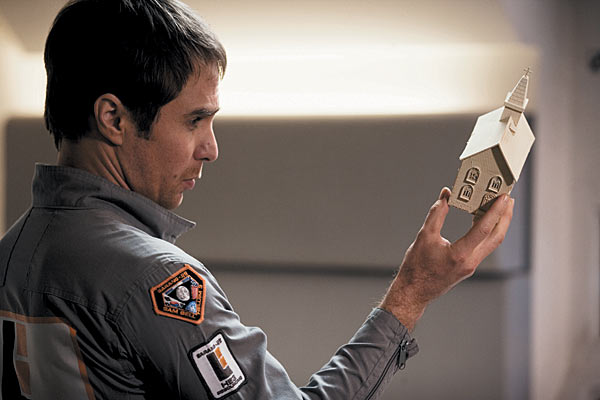Movie review by Greg Carlson
An impressive feature movie debut for advertising veteran and David Bowie scion Duncan Jones, “Moon” succeeds as both technical acting clinic and science fiction brainteaser. Like several of his father’s tunes, most notably “Space Oddity,” Jones’ story – which was crafted into screenplay form by Nathan Parker – ponders helplessness on a cosmic scale. Despite the movie’s lunar setting and spectacular views of starry space, the director focuses on the cramped confinement and numbing monotony of the central character’s miserable existence on the moon. Genre fans will be pleased with the film’s thoughtfulness and acuity.
Created on a modest budget that does not hinder the alternating scenes of claustrophobic isolation and the endless darkness outside the base, “Moon” introduces Sam Bell (Sam Rockwell), a tired Helium-3 miner nearing the completion of a three-year employment contract. Struggling to hold his sanity together, Sam’s only companion is an artificially intelligent computer named Gerty (voiced by Kevin Spacey in shades of Douglas Rain) that keeps tabs on Sam’s fragile mental state. Some of the best scenes in the movie exploit the cat and mouse dynamic between the two that sees Sam trying to outsmart his minder.
It is impossible to address “Moon” without acknowledging the movie’s sizable debt to Stanley Kubrick’s 1968 landmark “2001: A Space Odyssey.” From the antiseptic and strangely quotidian feel of the capsule interiors to the image of Sam jogging on a treadmill, Jones is not shy when it comes to emulating the master. “Moon” also includes Kubrickian videophone messages and hibernation pods, and Gerty’s presence closely mirrors the HAL 9000. The shadow of “2001” looms large over nearly every post-1968 science fiction movie with an intellectual agenda, and “Moon” joins Ridley Scott’s “Alien,” both the Tarkovsky and Soderbergh versions of “Solaris,” and Danny Boyle’s more recent “Sunshine” as stylistic offspring.
Following an accident in a moon rover, Sam awakes to discover his doppelganger, a perfect replica of himself. The two Sam Bells accept an uneasy coexistence as they try to solve the impossibility of their dilemma. Jones expertly directs the action to allow Rockwell the opportunity to not only inhabit two differentiated versions of the same character, but to play many scenes that require impeccable timing as the two men heatedly confront one another. Combining new and old-fashioned moviemaking tricks that would make Hayley Mills proud, “Moon” should tantalize would-be performers.
In an explanatory coda, “Moon” appears to close off several possibilities suggested in its early scenes. Some viewers, myself included, prefer to wonder whether Sam Bell’s otherworldly encounters might reside in his fatigued and strained imagination. Instead, the protagonist’s crucible functions more directly as a commentary on corporate greed and irresponsibility. The oft-repeated adage that the best science fiction uses a metaphoric future to comment on the present can be applied to “Moon,” and the movie’s fictional Lunar Industries (which echoes the mercenary culture of the Weyland-Yutani organization in the “Alien” series and the Tyrell Corporation of “Blade Runner”) will remind many of the post-Enron world in which giant, barely regulated machines operate without any moral gravity.
